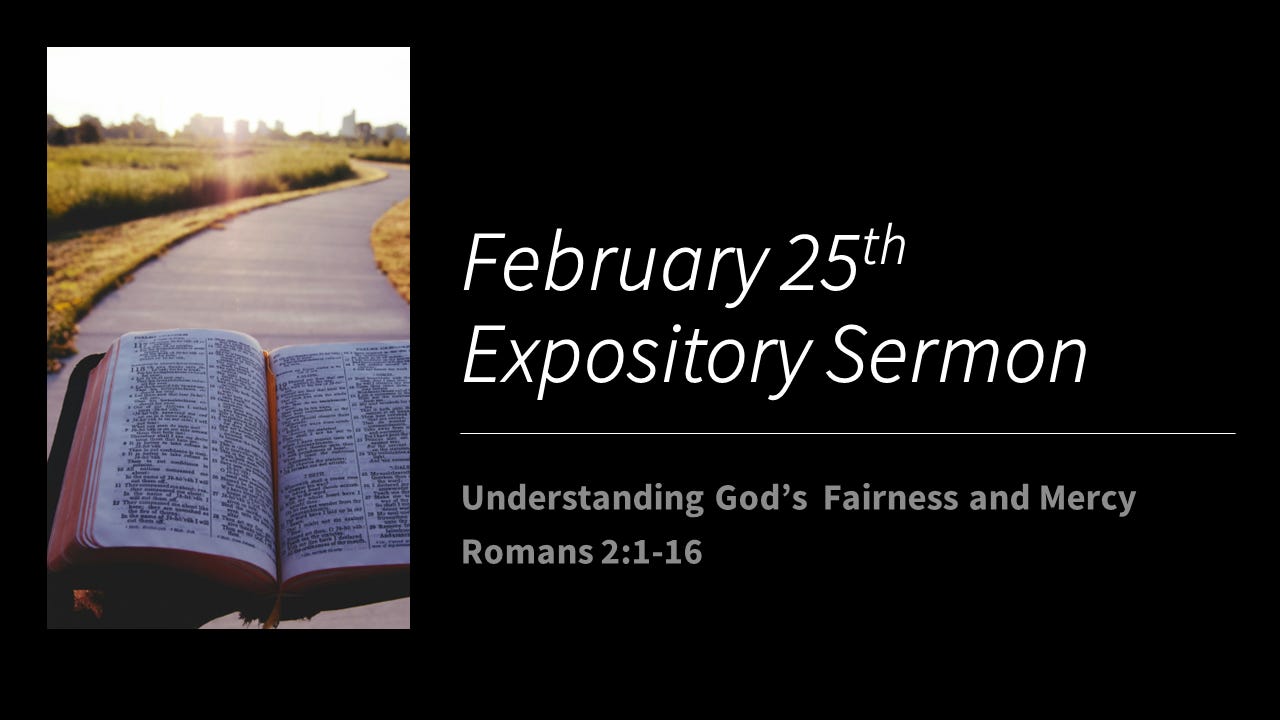Your February 25th Expository Sermon
Understanding God's Fairness and Mercy -- Romans 2:1-16
Sermon Outline: [NOTE to Paid subscribers — scroll down for the full manuscript sermon].
Understanding God's Fairness and Mercy – Romans 2:1-16
Introduction: We now transition into Romans 2:1-16, where the Apostle Paul shifts the focus from the blatant sinfulness of the pagan world to the moral and religious person who judges others. Here, Paul addresses the subtle yet equally dangerous sin of self-righteousness and hypocrisy, emphasizing God's impartial judgment and the need for genuine repentance.
I. The Danger of Judging Others (Romans 2:1)
Hypocrisy Exposed: Paul warns that anyone who judges others is without excuse, for in passing judgment, they condemn themselves. This is because they, the judges, practice the very same things they denounce in others.
II. The Principle of God’s Judgment (Romans 2:2-5)
According to Truth: God's judgment is based on truth, not external appearances or religious affiliations. Those who judge others while sinning themselves are inviting the just judgment of God.
Hardness and Impenitence: By stubbornness and unrepentant hearts, individuals store up wrath for themselves on the day of God's righteous judgment. This serves as a warning against the dangers of a hardened heart.
III. The Criteria of God’s Judgment (Romans 2:6-11)
According to Deeds: God will render to each person according to their deeds. This emphasizes that genuine faith must manifest in actions, not merely in religious identity or verbal profession.
Impartiality of God: There is no partiality with God. Both Jews and Gentiles are under the same standard of judgment - those who do good will receive glory and honor, and those who do evil will face wrath and fury.
IV. Law and Conscience in Judgment (Romans 2:12-16)
Jews and the Law: Those who have the Law (Jews) will be judged by the Law. This highlights the responsibility that comes with having received God's revelation.
Gentiles and Conscience: Gentiles, who do not have the Law, are a law to themselves, their conscience bearing witness to moral truth. Their thoughts will either accuse or excuse them on the day when God judges the secrets of men.
Conclusion: Romans 2:1-16 presents a comprehensive picture of God's fair and impartial judgment. It challenges us to examine our own hearts, to avoid the trap of self-righteous judgment, and to understand that true repentance is essential for all. This passage calls us to live in humble recognition of our need for God's mercy, striving to align our lives with His righteous standards. As we ponder these truths, let us be grateful for the grace available through Jesus Christ, which empowers us to live lives worthy of the gospel. Amen.



